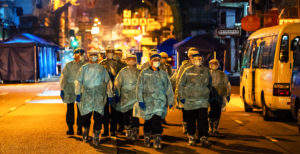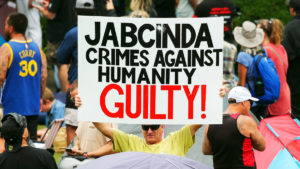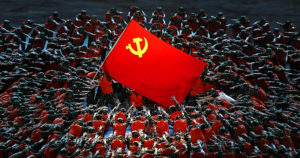“Young men, starting out in life, have often asked me ‘How can I become an Internee?’ Well, there are several methods. My own was to buy a villa in Le Touquet on the coast of France and stay there till the Germans came along. This is probably the best and simplest system. You buy the villa and the Germans do the rest”.
That was Wodehouse in 1941, from one of his Berlin broadcasts. But pretty much the same has applied 80 years later in Hong Kong, just with fewer Germans. If your goal has ever been to get locked in a room for weeks on end, then Hong Kong has become the place to be. The authorities would lock you up if you had Covid. They’d lock you up if you’d been close to someone who had Covid. At one point, they’d even lock you up if you’d been close to someone who’d been close to someone who had Covid.
You also got locked up just for getting into the country. You paid for the flight and the Hong Kong authorities would do the rest. Actually, that last bit wasn’t quite true: you had to book and pay for your room as well. But you get the point.
Brutal as it was — caring little for minor things like family separation or childcare — this system worked relatively well by its own standards until earlier this year. For extended periods there were no Covid cases at all and overall deaths remained low. But then Omicron broke through, as almost everyone knew it would: ironically, as the result of a cross-infection in a quarantine hotel, something the government had been warned about repeatedly.
There soon became too many cases to make asymptomatic people spend weeks in hospital and there were not enough isolation units to lock up close contacts. By the start of March, the death rate went through the roof, becoming the highest in the world at any point in the pandemic. They couldn’t process the dead quickly enough, with bodies stacked next to the living, in overrun, under-staffed, public hospitals. Hong Kong ran out of coffins as well as smugness. It became the premier place to be if you wanted to die from Covid.
The tragedy was how avoidable all this was. Having broadly succeeded in the initial stages of the pandemic, cutting down local case numbers down zero for months, Hong Kong had an opportunity — almost unique in the world — to transition, with as few deaths as possible, to a sustainable mitigation strategy.
Its failure not to take that opportunity has now been widely noted — as has its recent announcement that it would begin to relax some of its stricter restrictions. From outside, this has been presented as a pragmatic shift away from its policy of “dynamic zero Covid” to something akin to co-existence. The idea of “living with Covid” was previously verboten here, a sign of Western decadence and a failure to care about the value of human life, so any such shift would be profound.
Yet from within Hong Kong the shift seems less significant and reaction to the policy changes here have been more muted than some of the overseas coverage might suggest.
This is partly because the details are less dramatic than the headlines. Schools were told they could go back to face-to-face teaching, only for the government to then announce that they need to have achieved a 90% vaccination rate among staff and students before they could return to full days, something many will find next to impossible to achieve in what remains of the school year. Some of the more extreme rules remain: mask wearing is compulsory outside, even if exercising, even in remote country parks. There are still stories of the police lurking behind bushes to catch out knackered joggers who have pulled down their masks to catch their breath.
While the outright country flight bans that previously existed are to be dropped from April, and quarantine has been reduced to seven days (until recently it was 21), it’s still seven days more than most of the world insists on and it is also open only to vaccinated residents — no visitors at all. At any point, if an airline is found to have brought too many positive cases into Hong Kong, they are banned from that route for seven days. Travellers then have to rearrange everything, including the quarantine hotel, which is often simply not possible given the demand, and means not getting into Hong Kong for months. All of this remains a serious problem for Asia’s self-proclaimed “world city”.
But my suspicion is that the real reason people here are less impressed goes beyond the details of the changes; it is now a broader issue about lack of faith in the government, and the absence of any strategy.
For some, this is inextricably linked to the protests in 2019 and the government’s heavy-handed response — something for which a fair few people have been locked up, and for longer than three weeks. A significant proportion of Hongkongers wouldn’t trust the government whatever they did. But even if you are one of those who thinks that the Hong Kong government was right in its approach, it is difficult to say that it has recently demonstrated competence. It is not just the failures to prepare properly for the current outbreak — although that alone should have been enough to have ended multiple political careers. There have also been constant U-turns on policy.
Perhaps the worst recently was the announcement that all the school term dates were to change, bringing forward the summer holiday to Easter — I am not making this up — to allow school buildings to be used for a city-wide testing programme. Then it was floated that this might also simultaneously involve a lockdown, which triggered panic-shopping; only for the government to then decide that maybe they didn’t want to do any of it after all.
Given the U-turns so far it would be a brave person who would bet against another massive reversal of policy months down the line. What happens when case numbers start to rise again? Or there are the inevitable outbreaks in schools?
One common response to this is to say something like: “Of course, they can’t say they are going to live with the virus. That would involve too much loss of face. But that’s obviously what they are doing”.
But there are two problems with this argument. The first is that there is plenty of evidence that this is not what they are doing: at the same time as there is talk of reopening the schools and the borders, the government has also been building multiple new isolation centres. Mass testing may have been put on hold, but compulsory testing of people who have been in places with Covid cases has restarted. As case numbers have fallen to more manageable levels, so people have begun to get put back into isolation. None of this looks like living with the virus.
Second, even if this were true, it is never a good sign for any government to say it is doing one thing while doing another. Even if the people at the top of government think they are following a plan, it makes it less likely for there to be a proper alignment of strategy and implementation. Chief Executive Carrie Lam has said that Hong Kong’s struggle with Covid is akin to a war, so it’s worth considering what Clausewitz said about military strategy. It was “to identify the decisive point and to concentrate everything on it, removing forces from secondary fronts and ignoring lesser objectives”. We shouldn’t necessarily have expected the Hong Kong authorities to have read Clausewitz — but at times they act as if they have read him only so they can work out how to do the exact opposite. There is no identification of the decisive point, no concentration of resources, and there’s always a host of lesser objectives.
In the same way that the massive focus on locking people up and keeping out those from overseas distracted what should have been the main priority of vaccinating people in care homes, only last week Lam argued that Hong Kong needed both to reopen the mainland border and to open up to international travel. Yet these are in direct tension. As long as the policy on the mainland is for Zero Covid, the mainland border won’t open up while there are outbreaks in Hong Kong — but if you allow international travel without quarantine, you will get outbreaks. “To govern,” as Pierre Mendès-France put it, “is to choose.” Hong Kong’s administration cannot choose, and thus it cannot govern.
One of the curiosities about Hong Kong — at least to a polling junkie like me — is the almost complete lack of decent opinion polling here. When asking awkward questions can get you threatened with the National Security Law, it is difficult to ask tricky questions or expect honest answers, and to know what people really think.
But for many the tipping point has been reached and people are voting with their feet. A full 1% of the population left last month. Some may be coming back, but lots are not. And sure, in time, when all this is a distant memory, others will come in to replace them, but the immediate consequences are significant. Talent drains, organisations relocate, businesses fold. The infrastructure won’t return, the diversity is lost. It is said that the recent promised policy shifts came in response to pleas from the city’s great and good, worried that irreversible damage was being done to Hong Kong’s status as a financial centre. These pleas were too quiet, and, for many, too late.
Disclaimer
Some of the posts we share are controversial and we do not necessarily agree with them in the whole extend. Sometimes we agree with the content or part of it but we do not agree with the narration or language. Nevertheless we find them somehow interesting, valuable and/or informative or we share them, because we strongly believe in freedom of speech, free press and journalism. We strongly encourage you to have a critical approach to all the content, do your own research and analysis to build your own opinion.
We would be glad to have your feedback.
Source: UnHerd Read the original article here: https://unherd.com




